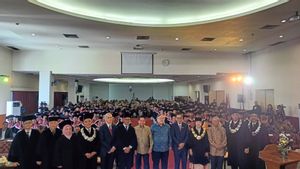JAKARTA The mandatory additional pension fund by cutting the wages of workers who are being called by the government is still the talk of various groups. In the midst of the series of negative impacts that may occur, this additional pension fund contribution is considered to be able to ease the burden on the sandwich generation.
Currently, the government is working on regulations related to mandatory pension funds for workers in Indonesia. Simply put, private employees will later be charged with additional contributions for pensions, after previously there was Old Age Security (JHT) and Pension Security (JP) BPJS Ketenagakerjaan.
This policy will be regulated in Government Regulation (PP) and downgraded in OJK Regulations. Regarding its implementation, it can be through the Employers' Pension Fund (DPPK) and the Financial Institution Pension Fund (DPLK).
Chief Executive of Insurance, Guarantee, and OJK Pension Fund Ogi Prastomiyonno emphasized that this step was taken to increase the replacement ratio at retirement compared to the latest income before retiring. Indonesia's replacement ratio is currently still below the standard International Labor Organization or ILO.
Ogi said, ILO recommends a minimum replacement ratio of 40 percent. But in reality, the replacement ratio in Indonesia is still in the range of 15 to 20 percent. The low replacement ratio makes many retirees rely on their families to meet their needs. Thus, this condition makes it difficult for the chainandwich generation to break.
On one occasion, Ogi said that the replacement rate of 40 percent was an agreement globally. In many countries, this figure is enough to make retirees live independently.
According to data from the Organization for Economic Cooperation and Development or OECD, Luxembourg is the country with the highest replacement ratio, where full-time workers get more than 100 percent. This means that the pension funds obtained are higher than before retiring.
Austria, Greece, Hungary, Italy, Spain, and Turkey also have a satisfactory repplacement ratio, which exceeds 75 percent. Meanwhile, France, Iceland, Japan, Norway, and the Slovak republic ratio is around 50 percent.
Citing the official ILO page, by ensuring income for the elderly and other vulnerable groups, the pension system can prevent poverty, reduce inequality, and facilitate smooth consumption.
SEE ALSO:
Meanwhile, according to Ogi, pension funds will keep people's purchasing power maintained when there is a transition from productive age to non-productive age. Unfortunately, as previously mentioned, the replacement ratio for Indonesia is still far from standard with only 10-15 percent.
With the replacement ratio in Indonesia as it is today, many retirees rely on their children to meet their needs. Therefore, continued Ogi, pension funds are also one of the options to break the chainandwich generation.
Sandwich generation is a young adult generation who has a double financial burden, which is a responsibility in meeting the financial needs of themselves or their families if they are married and their parents.
"If we refer to the current term, namely the sandwich generation, we believe that pension funds are one of the financial solutions to break the bandwich generation," he said, at the launch of the 2024-2028 Indonesian Pension Fund Development and Strengthening Roadmap in Yogyakarta on July 8.
According to a survey of 1,828 productive age respondents (25-45 years) spread across Indonesia in September 2021, as many as 48.7 percent are the sandwich generation that has financial responsibility for their families.
Furthermore, from all generations of sandwiches in Indonesia, only 13.4 percent have financial readiness to meet basic expenditures, save, and invest.
Economist from the Center of Economic and Law Studies (Celios) Nailul Huda supports efforts to increase pension benefits for workers. He said the higher the replacement ratio will further reduce the spacendwich generation, because retired parents can have decent income and do not burden their children in financing their needs.
According to Huda, the replacement ratio for Indonesia, which is only in the tens of percent, occurs because there is still an assumption that the cost of living for parents when they retire is borne by their children.
"This must be changed so that it does not become a burden for their children in the future," said Huda.
Increasing the replacement ratio can be done with several steps, one of which is an increase in additional mandatory contributions that are adjusted to an increase in income or salary. Huda also said that pension funds can be placed in a profitable and safe portfolio.
However, according to him, the government must solve a number of problems before applying mandatory additional pension funds. There is a matter of thrust issue or the issue of trust in the management of pension funds by the government which is still in disarray according to the community.
"The last case of Taspen's alleged corruption is Rp. 1 trillion. If it cannot be resolved or fixed first, this program will not work," continued Huda.
In addition, Huda also highlighted a decrease in purchasing power because government policies included an increase in VAT rates of 11 percent last year and soaring staple prices. He encouraged the government to cancel the plan to increase VAT rates to 12 percent next year so as not to burden the community.
"It is better if the government pension fund program is also measured with contributions that increase gradually. Do not suddenly increase significantly which will burden the community," continued Huda.
The English, Chinese, Japanese, Arabic, and French versions are automatically generated by the AI. So there may still be inaccuracies in translating, please always see Indonesian as our main language. (system supported by DigitalSiber.id)


















